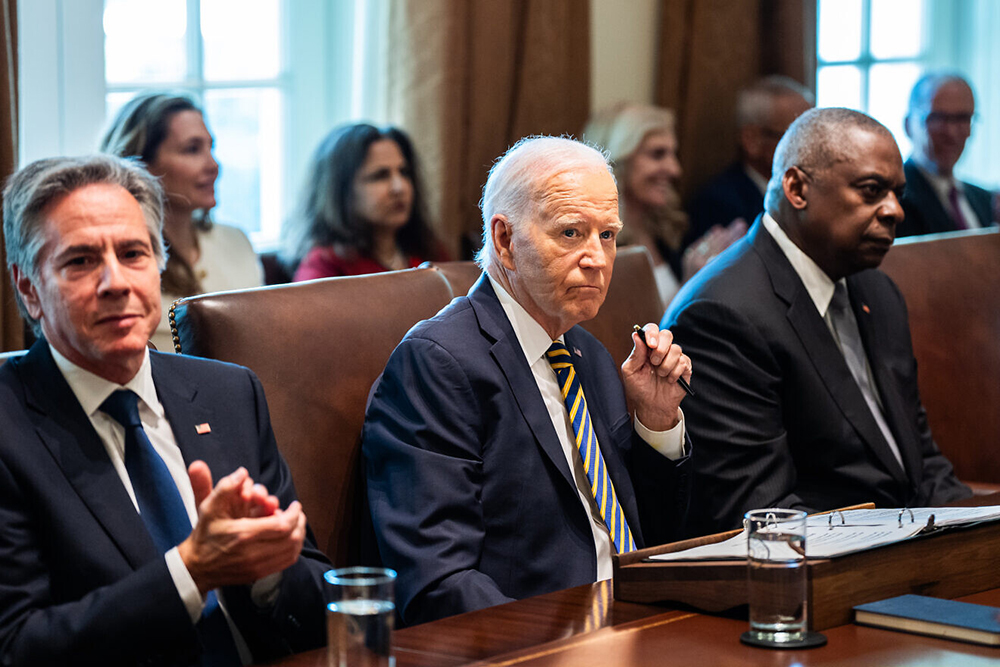|
Getting your Trinity Audio player ready...
|
Failure to comply “may have implications for U.S. policy,” U.S. Secretary of State Antony Blinken and Defense Secretary Lloyd Austin reportedly wrote.
By: Akiva Van Koningsveld
If the Jewish state doesn’t take a series of measures to improve humanitarian conditions in the Gaza Strip within the next 30 days, it could risk “implications” for U.S. policy, potentially including an arms embargo, according to a letter from the U.S. defense and state secretaries leaked to Axios.
The letter, which Axios published on Tuesday, purports to come from Antony Blinken, the U.S. secretary of state, and Lloyd Austin, the U.S. defense secretary. It is addressed to Yoav Gallant, the Israeli defense minister, and Ron Dermer, the Israeli strategic affairs minister.
“Starting now and within 30 days,” Jerusalem should implement 15 policy changes to avoid a possible arms embargo, the letter states. “Failure to demonstrate a sustained commitment to implementing and maintaining these measures may have implications for U.S. policy under NSM-20 and relevant U.S. law.”
Under NSM-18, issued on Feb. 23, 2023, one of the U.S. foreign policy and national security objectives is to “prevent arms transfers that risk facilitating or otherwise contributing to violations of human rights or international humanitarian law.”
NSM-20, a national security memorandum that U.S. President Joe Biden issued on Feb. 8 about “safeguards and accountability with respect to transferred defense articles and defense services,” requires the secretary of state “to obtain certain credible and reliable written assurances from foreign governments receiving defense articles.”
It also directs the defense and state secretaries to “provide periodic congressional reports to enable meaningful oversight” and ensure that all defensive weapon transfers ” are conducted in a manner consistent with all applicable international and domestic law and policy, including international humanitarian law and international human rights law.”
Among other measures, the letter calls on the Jewish Israel to allow at least 350 aid trucks to pass through existing border crossings daily and to open a fifth crossing.
Israel is also instructed to announce “adequate humanitarian pauses across Gaza” for at least four months, rescind evacuation orders, remove a ban on the entry of “container and closed trucks,” authorize certain items with dual military use to enter and confirm that there will be no “policy of forced evacuation of civilians from northern to southern Gaza.”
The missive also reportedly expresses concerns about proposed Knesset legislation that would shut down activities in the Jewish state of the United Nations Relief and Works Agency, declaring the U.N. body a terror group and stripping its staff of diplomatic privileges.
“While we share your concerns about the serious allegations of certain UNRWA employees participating in the Oct. 7 terrorist attacks and of Hamas misusing UNRWA facilities, enactment of such restrictions would devastate the Gaza humanitarian response at this critical moment,” per the letter. “We ask that you take all possible steps, whether with lawmakers or using the authorities of the Prime Minister’s Office, to ensure that this does not come to pass.”
Citing reports of abuses against terrorists captured during Hamas’s Oct. 7 massacre and the Gaza ground campaign, the letter urges Israel to immediately allow the International Committee of the Red Cross to visit all “individuals detained in connection with this conflict.”
“It is vitally important that our governments establish a new channel through which we can raise and discuss civilian harm incidents,” the letter concludes. “Our engagements to date have not produced the necessary outcomes. We ask that the initial virtual meeting of this channel be held by the end of October.”
In May, the U.S. State Department issued a report to Congress about U.S. arms transfers to Israel that was deeply critical of the Jewish state but stopped short of concluding that it was violating international law.
“Given Israel’s significant reliance on U.S.-made defense articles, it is reasonable to assess that defense articles covered under NSM-20 have been used by Israeli security forces since Oct. 7 in instances inconsistent with its international humanitarian law obligations or with established best practices for mitigating civilian harm,” the report stated.
The report noted that individual violations of international law do not mean that a country is not committed to following the law. It added that Israel has several “active criminal investigations pending, and there are hundreds of cases under administrative review” about its own conduct.
In March, Jerusalem provided a written letter to Washington declaring that it abides by international law when using weapons transferred from the United States, which was another requirement of Biden’s memorandum.
The Israel Defense Forces has been fighting to defeat Hamas in Gaza since the terror group led a mass invasion of southern Israel on Oct. 7, 2023, murdering 1,200 people, primarily Jewish civilians, wounding thousands more and kidnapping 251 people to Gaza, where 101 remain.
Jerusalem has rejected any accusation that the IDF does not comply with international law or is interfering with humanitarian aid efforts and has accused Hamas terrorists of stealing the majority of the aid. At times, the White House and the State Department have admitted that the terror group is known to seize aid.
(JNS.org)





